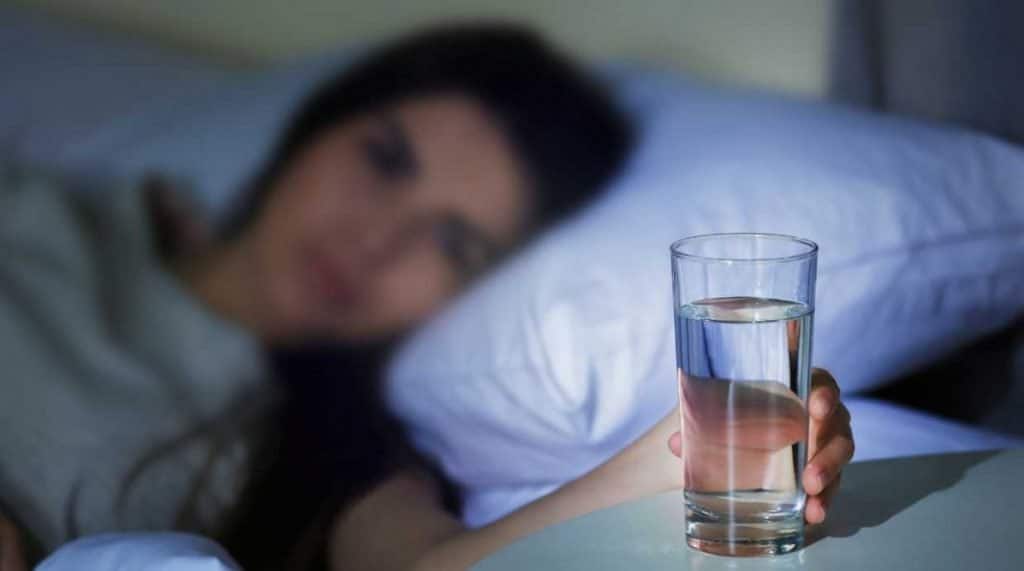

If you find yourself waking up with a dry mouth at night, bedtime can become an unpleasant experience, affecting the quality of your sleep and, by extension, your overall wellbeing. You may also experience accompanying symptoms, such as a sore throat, bad breath and cracked skin around the mouth area. In order to choose the best way to go about treatment, it’s vital to pinpoint the exact cause of these issues.
In this article, we’ll cover what can trigger the condition and some easy-to-implement remedies that will have you waving goodbye to a dry mouth once and for all.
Xerostomia (the medical term for dry mouth) can have many causes, but if you suffer from this issue only during the night, it’s relatively easy to establish a cause and effect. In this case, something very simple and straightforward could be the culprit. The most common reasons and their resolutions are listed below.
Breathing through your mouth causes it to dry up, resulting in unpleasant sensations in your throat and even a burning in the mouth. The solution to this is simply to learn to breathe through your nose instead. If you find that you snore at night and can’t get into a comfortable position for nose-breathing, the best way to help yourself would be getting a mattress to help you stop snoring. Find a pillow that will provide your head, neck and shoulders with the support they need – orthopedic pillows are the best choice here, hands down.
If you have thick saliva accompanying your dry mouth symptoms, check in with your health practitioner, as this could be a sign of a more serious condition. However, if this is something that you’ve always experienced, or if you’re dehydrated and notice that your saliva has become thicker as a result, simply drink plenty of water throughout the day and keep a glass of water near your bedside, so you can drink some when you wake up. Sucking on sugar-free lozenges is also a good idea.

If you notice that you’re getting a dry mouth after being prescribed new medication, check if this symptom is mentioned in the side effects in the included pamphlet. Go back to your doctor and discuss switching to a new medication or trying a different dosage.
If the air in your home lacks moisture, it can exacerbate or trigger xerostomia. Get a humidifier for your room, especially if you live in a dry climate.
Remove caffeine, cigarettes, alcohol, sugar and soft drinks from your day-to-daily intake – these make tooth decay all the more likely, more so if you get a dry mouth, as saliva usually washes away a lot of the bacteria that cause tooth decay Trusted Source Cavities/tooth decay - Symptoms and causes - Mayo Clinic Cavities are permanently damaged areas in the hard surface of your teeth that develop into tiny openings or holes. www.mayoclinic.org .
If you use alcohol-containing products, such as a mouthwash containing alcohol (look out for “ethanol” in the active ingredients), this can really dry out your mouth, so try switching to one with a different formula.
Prolonged xerostomia can result in tooth damage, discomfort and a poor quality of sleep. Those with dry mouth have an increased risk of dental caries Trusted Source Risk factors in dental caries - PubMed The three main factors in dental caries–diet, microflora and a susceptible tooth–were identified almost 100 years ago. Since that time a large number of further local and general risk factors have been identified. www.ncbi.nlm.nih.gov . If you find this issue is causing you a lot of discomfort, you should definitely consult with your doctor and dentist for some advice on the best way forward, especially if it is accompanied by additional symptoms such as:
Sometimes something as innocent and inconspicuous as a dry mouth can be an indicator of a more serious condition and the only way to get a clear picture is to see a healthcare professional.
A dry mouth at night is usually nothing to worry about, if it’s not something that impacts your overall sense of wellbeing, and especially if the problem is easily resolved by something simple, such as drinking some water. However, if you find this to be a persistent symptom for longer than a few weeks, or if the xerostomia comes with other unpleasant symptoms, don’t put off visiting your doctor to determine any underlying causes and to get the most effective treatment, tailored to you.





